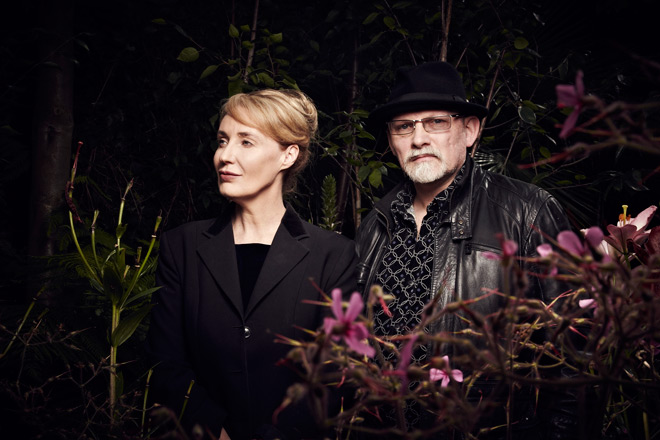
Offering mesmerizing soundscapes, their style is often described as worldly, dark, and most certainly avant-garde. Whatever it may be, Dead Can Dance is a entity all their own and continue to find new and extraordinary ways to creates with their latest record Dionysus. A collection of musical movements, founders Brendan Perry and Lisa Gerrard successfully crafted an album that requires the attention of it’s audience from beginning to end. Now preparing to return to touring the world, Multi-instrumentalist/Singer Brendan Perry took the time to chat about the philosophy behind Dead Can Dance, the inspiration for Dionysus, future plans, plus much more.
Cryptic Rock – Dead Can Dance came together nearly four decades ago, and in that time have been one of the most compelling musical projects out there. Dark, exotic, and constantly taking new directions, how would you describe the exploration of Dead Can Dance?
Brendan Perry – There are two main drives. Each successful release, each venture into new musical territory is really driven by curiosity more than anything else. Subsequent emotion in music, literature, art, or cinema, that inspires us. To give you an example, when we migrated across from the first album, which is like a Post-Punk album, to the second album, Spleen and Ideal (1985), which has more Neo-Classic aspects, that was a direct consequence of listening to a lot of Classical music and being fortunate enough to live very close to a music library in London. That was the inspiration bedrock for wanting to move into a Classical idiom. Each subsequent album is a reflection of what musics we’re listening to that inspire us. I suppose the spaces in between the albums are really filled with research and imbibing on on these different musics, cultures, and traditions.
The second strain is really to do with trying to find plurality and universality amongst all these genres, traditions, and peoples. It’s kind of a spiritual quest for wanting to find what is it we have in common as a human species, opposed to what divides us. In this sense, it is a search for the universal which is also reflected in our art.
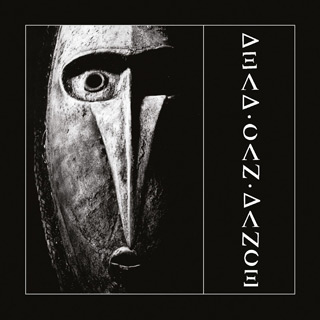
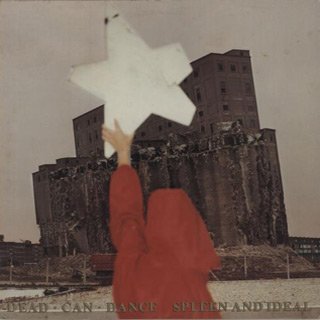
Cryptic Rock – It is quite fascinating to hear about the evolution of Dead Can Dance and indulge in the music through the years. As mentioned, Dead Can Dance has always been vastly different than anything else out there. Some would call the band New Age, others would say it is a worldly Art Rock band. You have kept the music coming through the years and, very recently, returned with your first studio album of new material in six years, Dionysus. What was the writing and recording process like for the new record?
Brendan Perry – The concept was really a direct result of about two years ago when I read Friedrich Nietzsche’s The Birth of Tragedy from the Spirit of Music (1872). In this book he talks about early Greek tragedy/theater. More importantly, these two principle drives that he recognized in Greek cultural and creative thinking – Apollonian and Dionysian. The combination of these two energies, disciplines, or lack of discipline in Dionysian’s case, is something which creates the most sublime art.
For me, it was a kind of a revelation reading this. He is describing something which is kind of controlled and has an Apollonian order where the intellect is really in charge of the creative process. But, underline that, and part of it is a Dionysian tendency. The kind where dreams are sublimated into these kind of emotional subliminal unconscious, primal release mechanisms. The combination of these two makes things really interesting and exciting. That spurred me on to want to know more about Dionysus. I read further history books, watched a lot of documentaries, and, as a consequence, the concept for the album sort of formed in my mind.
Cryptic Rock – Very interesting and in-depth. The music of Dead Can Dance has always lent itself to cinematic qualities. That in mind, this new record is broken into acts. What was the vision behind the layout and flow of the music?
Brendan Perry – The idea behind it was two-fold. I suppose the model for it was really classical works, ones that were representative of 19th century Romantic Classicism. Even like Stravinsky’s “The Rites of Spring,” which is a Dionysian work, was kind of an inspiration in that sense. I wanted to give representation in an impressionistic way of different facets of the cult and myth of Dionysus in movements – in two acts with seven movements. I wanted to have the listener appreciate it from a perspective, from listening to it from the beginning to the end in order to get the most out of it, as opposed to having separate songs that make up an album. This is very much a conceptual work where all the parts are a sum of it’s whole. The medium for that really kind of dictated it was vinyl; I really wanted to release this record on vinyl. I wanted to make it a length that was conducive to the best quality and not run beyond 38 minutes a side where the fidelity would exponentially decrease as a result. That is why it’s in two acts, for side A and B.

Cryptic Rock – There was certainly a lot of thought put into it all. Vinyl is really the only format that you can’t skip ahead. With a CD or digital streaming, you can skip ahead. With vinyl, it forces you to pay attention and listen to the composition from start to finish.
Brendan Perry – Yes! You referred to the cinematic aspect of it. In terms of pre-cinema, Classical music, say from the 19th century, people went to concerts for a cinematic experience in their minds and imagination. It wasn’t supplied to them, but their imaginations could run with that. I remember some of my most earliest, most beautiful experiences listening to music was precisely that: being in a room with the lights off and just listening to an album from beginning to end. The arrangement of the album is kind of a return to that for me, it is the way it was intended to be listened to.
Cryptic Rock – A lot of people can relate to your experience in regards to listening to music and developing their own visual images from just listening. It is your imagination that brings the music to life; you create your own imagery, much like reading a book.
Brendan Perry – Exactly! Today too much is taken away from people’s imagination, I feel. People are so demanding that they want to have too much, like their eyes are bigger than their bellies. It is really a two-way street with music and the listener; there has to be a correspondence, a meeting ground.
This album also leans itself towards ritualistic of the whole listening experience. To get the most out of it you have to sort of succumb to that ritual of sitting down, taking time, and increasing your attention time span somewhat. You will get the most from art, not just this album, but anything that way sit down and read a book rather than skip across extracts. There is something about sitting down and letting the mind go in a linear time fashion with a work of art.
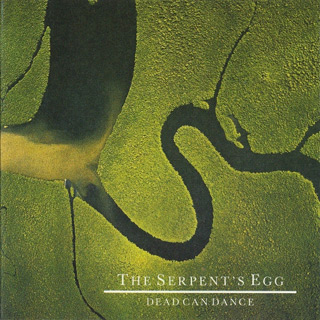
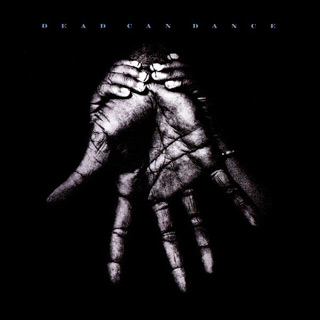
Cryptic Rock – Agreed completely. With the music of Dead Can Dance, you always utilized such an array of different sounds throughout the years. When working in the recording studio, what challenges do you face when trying to be sure each subtle texture is heard and the mixes are not overcrowded?
Brendan Perry – The real challenge is to keep interested and keep focused. When you work on your own for a long period of time, things take a while to develop; it’s a bit like crafting. As I’m writing, I am also mixing and producing as I go. It is kind of a like a hearing is a believing mythology. That is another big problem: to be subjective and objective – to be able to stand back from the music as your creating it and hear it with fresh ears time and time again. Over a protracted length of time writing and creating, this becomes more and more difficult. It’s all about keeping focus really; it’s a mountain you have to climb. (Laughs) It’s a lot easier when you are working in a group with several other people. All the parts are written in real time and you can arrange things far more quickly then you can when you are on your own wearing several hats at the same time.
Cryptic Rock – Understandable. It sounds as if it can become a little overwhelming at times when working on your own.
Brendan Perry – Yeah, it’s tough but it’s very rewarding – you get to understand the music more. You internalize it, obviously, but you can understand it from so many different aspects. You are really into micro detail, rather than standing off to the side and appreciating what others are doing and focusing on your own. You appreciate it in its entirety.
Cryptic Rock – That is a very good point. Seeing the spectrum of sound from Dead Can Dance come to life in a live venue is truly fascinating. That in mind, you do have a list of dates coming up in 2019, many of which are sold out. With the new material in hand, what can fans expect from these live shows?
Brendan Perry – We won’t be performing Dionysus. Apart from the technical aspects of performing it, which will require at least a minimum six singers and a lot of multi-instrumentalists, it wouldn’t fill an entire concert bill. We would have to augment it with a lot of other material, and that would be kind of incongruous. I wouldn’t want to break it up into constituent components; as mentioned before, it’s designed to be listened to in its entirety.
We decided because of the kind of impracticality of that, we would celebrate our musical legacy. We decided we would perform tracks from studio albums from the ’80s and ’90s that we never actually performed before. We also realized that the recent generations of listeners of our music had never heard us perform our music from the ’80s or even the ’90s. We decided to make this a celebration and legacy tour. We are also going to write some new material, especially for the shows to bring it up to date.
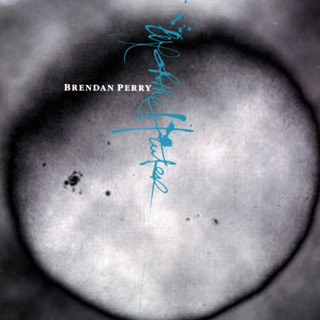
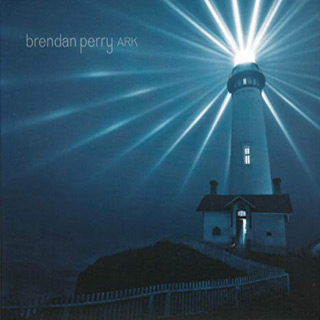
Cryptic Rock – That is exciting to hear! It has been a while since you have played North America. Is it a possibility to see Dead Can Dance visit North America in 2019?
Brendan Perry – It will probably be in 2020 – next year is just Europe. I am doing a solo tour, as well, for an album I am going to release next autumn. The whole year is really taken up with touring Europe, and hopefully we want to branch out in 2020 to the rest of the world. That’s the plan.
Cryptic Rock – That sounds like a good plan. It seems there are a lot of great things coming up for you, as well as Dead Can Dance, into 2019 and beyond.
Brendan Perry – Yeah, I haven’t stopped keeping busy. I am really looking forward to going back home and playing live concerts. After a few years in the studio, you get a bit of studio-itis. The thing I really love to more than anything else is to perform live and travel. That’s what we are going to do for the next two years.
Cryptic Rock – Speaking about performing live, a lot of the music you have written and performed is about connecting us through cultures musically. Since you have played so many different parts of the world, what is the reaction you get from people everywhere?
Brendan Perry – Obviously the reaction is positive. People who come to our shows generally know our music. The reaction changes though culturally; audiences are different in various parts of the global. Case in point, Japanese audiences really don’t share their appreciation until the very end of the show, then you can be in somewhere like Croatia where they are screaming and raving all the way through. (Laughs) There are many cultural differences in regard to the etiquette of the way people behave in a concert environment. It’s all good, though: you just take it on board wherever you go. That’s the way it’s done – when in Rome.
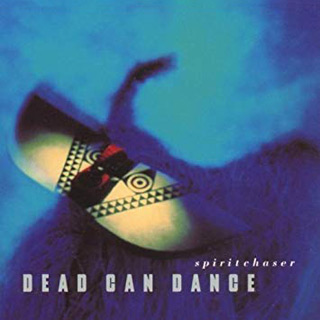
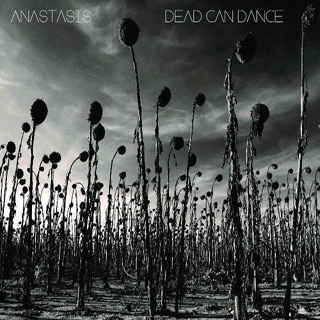
Cryptic Rock – Yes, it is just really interesting to see how different people react to music in a concert environment and show their emotion.
Brendan Perry – I find it interesting. Portugal is a good case in point: there is a sense of melancholy, it is very much part of the people’s character. I think because we make a lot of music that is quite melancholy and sad, it is picked up by people with this kind of pertinacity. There is also that dynamic all around the world: different people have different characteristics. You can use the old cliche of hot Latino – they like color, energy, lights, and fire. Then on the other side of the coin, you have even the Polish, who are kind of laid back and reserved, who are quite melancholy. There is everything in between.
Cryptic Rock – Those are the colors that make the world such a compelling place. Last question. We also cover Horror and Sci-Fi films on Cryptic Rock. If you are a fan of either or both genres, what are some of your favorites and why?
Brendan Perry – Sci-Fi yes, for sure. I read a lot of Sci-Fi when I was a teenager, especially Phillip K. Dick and J.G. Ballard. I am not so much into Horror, but Science Fiction definitely. In regards to films, I love Gattaca (1997), I thought it was a beautiful film. The Matrix series is really good, because the story is really interesting. I really like films from the ’70s, like the original Solaris (1972). There are just so many, but I think I tend to like films with dystopian futures. I really like intelligent films that are protracted out from the present day and sort of give you a glimpse into a possible future – whether that be a Brave New World (1932) style or a 1984 (1949) dystopian viewpoint style. I find them really fascinating, the ones that are intelligent and attempt to predict likely outcomes, the way the world is if we go down this route – things like Minority Report is a good example.
I am not so keen on the big Hollywood disaster movies. (Laughs) I am fascinated about possible dystopian futures based on science, opposed to fantasy. There is kind of a line where, with fantasy, you get fairies and pixies and stuff – that’s not for me.
Cryptic Rock – There are quite a few great dystopian styled Sci-Fi movies from the 1970s and 1980s.
Brendan Perry – Yeah, it is kind of a growing genre in that respect, with all the huge kind of problems we have now in terms of pollution, plastic in the ocean, artificial intelligence, drones. A dehumanization process seems to be in full effect at the moment. It’s interesting, especially on the AI front. I think it forces us to question our human identity and who we actually are. It’s a sort of metaphysical extensionalism, which is good if we start to ask these questions and respond to what kind of future we want to leave successive generations. We really have to deal with these questions.

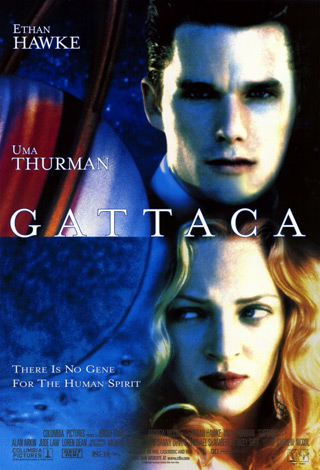
Cryptic Rock – Most certainly. That is where a lot of Science Fiction literature and films have predicted the direction we have gone.
Brendan Perry – It is like Arthur C. Clarke predicting satellites. It’s amazing how much Science Fiction has actually influenced people’s imaginations to create things for the future; it’s a catalyst for that. It’s like acting the product of the human imagination, when it’s put into a practical mode with the right will power behind it, you can achieve anything really. It’s quite incredible!
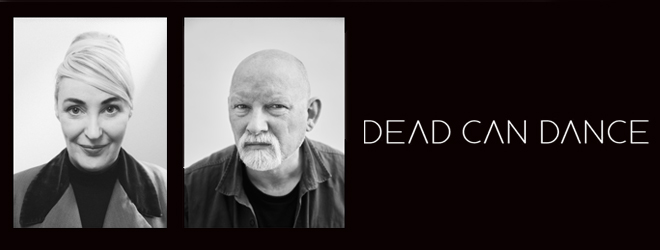

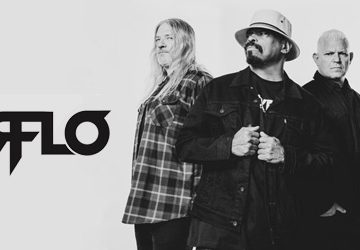


No comment